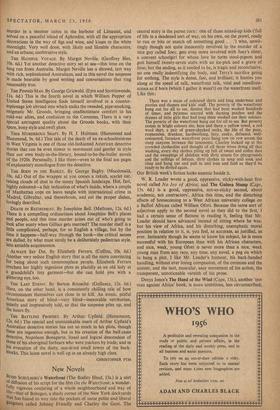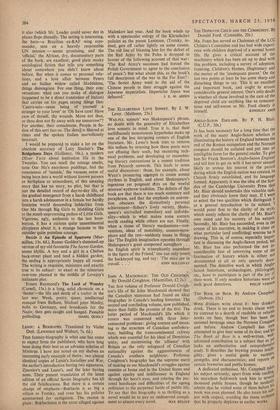New Novels
hUDD SCHULBERG'S Waterfront (The Bodley Head, 15s.) is a sort of diffusion of his script for the film On the Waterfront; a wonder- fully vigorous conjuring of a whole neighbourhood and way of life—that of Bohegan, a shady corner of the New York dockyards that has found its way into the pockets of some polite and liberal gangsters called Johnny Friendly and Charley the Gent. The
central story is the purest corn : one of those mixed-up kids (lull of life in a deadened sort of way, on his own, on the prowl, ready to run or bite or snatch off something good . . .') who, unwit- tingly though not quite innocently involved in the murder of a nice guy called Joey, gets even more involved with Joey's sister, a convent schoolgirl for whose love he turns stool-pigeon and gets himself twenty-seven stabs with an ice-pick and a grave of lime; but the ending, as it needed to be, is tragic and inconclusive, no one really indentifying the body, and Terry's sacrifice going for nothing. The style is dense, fast, and brilliant; it hustles you along at the speed of talk, waterfront talk, vital and unselfcon- scious as if born (which I gather it wasn't) on the waterfront itself. Like this :
There was a maze of coloured shirts and long underwear and panties and diapers and kids' stuff. The poverty of the waterfront hung out for all to see, denims that had been washed hundreds of times, and pyjamas scarred with darning patches and the dresses of little girls that had long since washed out their colours. The poverty of the waterfront hung out for all to see. But poverty comes in bright colours too, here and there a yellow towel, a red wool shirt, a pair of green-checked socks, the life of the poor, respectable, drunken, hardworking, lazy, cocky, defeated, well- connected, forsaken waterfront poor hung row on row across the steep canyons between the tenements. Charley looked up at the crowded clothesline and thought of all those wives doing all that washing, every day clothes piling up full of sweat and coffee dust and the sweepings of children with dirty streets for playgrounds and the soilings of infants, dirty clothes to soap and soak and rinse and hang out and pull in and iron and fold so they'd be ready to be dirtied again.
Our British week's fiction looks anaemic beside it.
W. R. Loader wrote a good, oppressive, sticky-with-heat first novel called No Joy of Africa; and The Guinea Stamp (Cape, 13s. 6d.) is a good, oppressive, not-so-sticky second, about academic, not contractors', Africa this time, and the disturbing effects of homecoming to a West African university college on
a Balliol African called William Ofori. Because the same sort of adjectives apply to the second novel as they did to the first, I
had a certain sense of flatness in reading it, feeling that Mr. Loader should have advanced instead of sitting where he was; but his view of Africa, and his disturbing, unemphatic moral position in relation to it, is, you feel, as accurate, as justified, as ever. Intimately though he seems to know his subject, ho is more successful with his European than with his African characters, and nice, weak, young Ofori is never more than a nice, weak young man from any race, any time, any novel, a peg on which to hang a plot. I like Mr. Loader's humour, his back-handed handling, without ever losing compassion, of the ominous and the sinister, and the taut, muscular, easy movement of his action, the transparent, unnoticeable varnish of his prose.
Denys Jones's The Hand of the Wind (Cape, 15s.), another 'one man against Africa' book, is more ambitious, less circumscribed;
it. also (which Mr. Loader could never do) in places flops dismally. The setting is interesting,
the hero—a Brazilian ex-RAF wing com- mander, sent on a heavily responsible UN mission — seems promising, and the 'official,' the African, dry, documentary parts of the book, are excellent; good plain stocky sociological fiction that tells you something about somewhere you didn't know about before. But when it comes to personal rela- tions, and a love affair between Peters and an Italian widow called Maddalena, things disintegrate. For one thing, their eon?
versations: what can you make of dialogue (supposed to be a direct translation of Italian) that carries on for pages, saying things like: 'Castro-mio—cease being of yourself a stranger to your lover' or 'Oh have care! Have care of thyself, thy wounds. Move not thus, or thou dost not fly away with me tomorrow!'? For another, their consciences. People in fic-
tion of this sort fuss so. The detail is blurred at times and the spoken Italian marvellously incorrect.
I would be prepared to stake a lot on the absolute accuracy of Lucy Sinclair's The Bridgeburn Days (Gollancz, 16s.), a modern Oliver Twist about institution life in the Twenties. You can smell the cottage smells, taste Our Ma's enormous puddings, feel the remoteness of 'outside,' the vacuum sense of being born into a world without known parents or birthplace or antecedents, of this amazing story that has no story, no plot, but that is just the detailed record of day-to-day life, of the gradual emergence from a harsh childhood into a harsh adolescence in a female but hardly feminine world descending ladderlike from Our Ma through Big Girls to Middling Girls to the numb unprotesting pathos of Little Girls. Vigorous, ugly, authentic to the last boot- button, it has a curious quite unsentimental chirpiness about it, a strange because to the outsider quite pointless courage.
Beside it An Episode of Sparrows (Mac- millan, 13s. 6d.), Rumer Godden's slummed-up version of my old favourite The Secret Garden, seems idyllic. A boy and a girl in a Chelsea back-street plant and tend a hidden garden; the ending is appropriately happy all round. The writing is exquisite, miniature and exactly true to its subject: as exact as the miniature rose-tree planted in the middle of Lovejoy's italianate plot.
'Ernest Raymond's The Lord of Wensley (Cassell, 15s.) is a long, solid chronicle on a 'theme'—the life and death of a traitor in the last war. Weak, pretty, queer, intellectual manqué from Balham, Michael joins Mosley, bolts to Germany, and broadcasts for the Nazis; then gets caught and hanged.. Passable



































 Previous page
Previous page